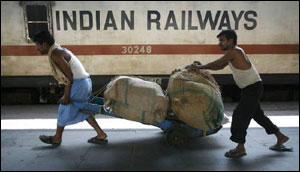 | « Back to article | Print this article |
In the coming Railway Budget (2013-14), Minister Pawan Bansal is unlikely to spring any major surprise and there is little chance of the first leg of a medium-term road map being laid out for a significant improvement in the finances of the national carrier, according to informed sources. In a Budget that is likely to be made up of “more of the same”, the upside is there may not be any sharp deterioration in the operating ratio in the revised estimates for 2012-13, compared to the Budget estimates.
In a Budget that is likely to be made up of “more of the same”, the upside is there may not be any sharp deterioration in the operating ratio in the revised estimates for 2012-13, compared to the Budget estimates.
The ratio has been helped by the rise in railway fares in January, which will bring in Rs 1,200 crore (Rs 12 billion) till March (partly negated by the rise in diesel prices for bulk consumers).
But the decision taken earlier in the year to cut development expenditure does not bode well for safety and passenger amenities. The latter, in particular, has been steadily deteriorating.
Expenditure under three heads - depreciation reserve fund, capital fund and development fund - has been cut by Rs 4,000 crore (Rs 40 billion), or 20 per cent of the budgetary estimate of Rs 20,600 crore (Rs 206 billion) in the current year.
This is to accommodate an emerging Rs 4,000-crore (Rs 40 billion) shortfall in working surplus compared to Budget estimates.
In the April-January period, total earnings went up by 20.4 per cent, compared to a growth of 27.6 per cent projected in the Budget estimates. In the same period, revenue earning freight carried is up 4.5 per cent, against the target set in the Budget of 5.6 per cent.
There is little scope for any substantial revision of fare and freight rates to bring in significantly more revenue in the coming year (2013-14). Passenger fares have been raised recently and freight rates earlier last year.
All that can happen is a “tinkering” with freight rates, raising a few and lowering a few others to marginally improve overall realisation.
Any real hope of the railways picking themselves up significantly can rest only on the prospects of a decent rise in freight volumes.
If the economy picks up there will be a chance of additional freight offerings but this can become